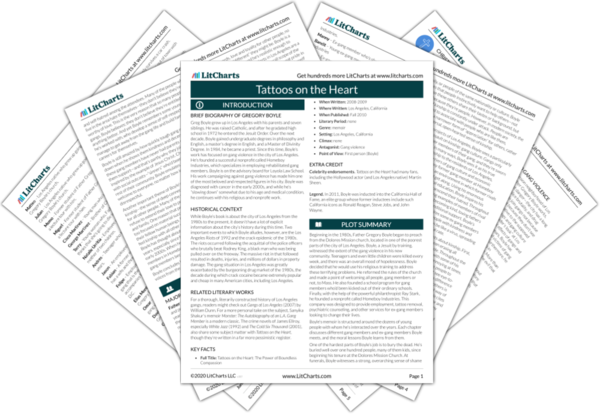One of the most important words that Father Gregory Boyle uses in Tattoos on the Heart is “outcast.” Boyle uses this word to describe most of the people who attend his church in the Dolores Mission, as well as the people whom his nonprofit, Homeboy Industries, employs. He doesn’t use the word in a prejudicial sense—rather, he’s just stating a fact: the majority of society has rejected these people, refusing to give them employment, friendship, or respect. Over the course of the book, Boyle unpacks the word “outcast” and uses it to make his own compelling points about how all people deserve to be treated.
From the beginning, Boyle makes it clear that being an outcast is nothing to be ashamed of. Just because society has cast a person out doesn’t mean that that person is worthless. To emphasize this point, Boyle frequently alludes to Jesus Christ and the fact that he spent his time with the poor, the downtrodden, and the sinful. Since being an outcast doesn’t negate one’s humanity, Boyle asks readers to recognize that outcasts are worthy of respect and compassion—even if most people don’t feel any kinship with them. Boyle lists dozens—even hundreds—of examples of supposedly worthless people who committed serious crimes, went to prison, but later went on to live happy lives structured around good, moral behavior. Boyle therefore opens his church’s doors to anyone who’d like to attend, even gang members. This action offends and frightens many of Boyle’s congregants. However, Boyle reminds these congregants of the strong Christian precedent for embracing outcasts, no matter how frightening.
Ultimately, the outcast’s shunned status says more about society at large than about the outcast. Too often, people don’t have the training or the courage to extend their kinship to strangers. As a result, they turn their backs on certain kinds of people, such as ex-convicts, who need their help. Boyle includes many anecdotes about people who say offhanded, offensive things about social outcasts. For example, he remembers a nurse who calls a murdered gang member a “monster.” However, this anecdote also underscores Boyle’s most important point: even if people sometimes cast others out, they have the potential to extend their kinship to everyone. The nurse in Boyle’s story is immediately reprimanded by a second nurse, who reminds her coworker that this dead gang member has a mother and a family, and he deserves her respect. It is this second nurse who upholds Boyle’s point about the universal capacity for kinship. Even if they treat certain kinds of people as outcasts, people instinctively want to be good and kind. By treating outcasts with kindness, Boyle hopes to change his society and set an example that the rest of Los Angeles will one day follow.
The Outcast ThemeTracker

The Outcast Quotes in Tattoos on the Heart
Suddenly, the welcome mat was tentatively placed out front. A new sense of "church" had emerged, open and inclusive, replacing the hermetically sealed model that had kept the "good folks" in and the “bad folks" out.
Out of the wreck of our disfigured, misshapen selves, so darkened by shame and disgrace, indeed the Lord comes to us disguised as ourselves. And we don't grow into this—we just learn to pay better attention.
"You will not clean this up. If there are people in our community who are disparaged and hated and left out because they are mojados (wetbacks) . . ." Then she poises herself on the edge of the couch, practically ready to leap to her feet. "Then we shall be proud to call ourselves a wetback church."
This man sees all this and shakes his head, determined and disgusted, as if to say "tsk tsk."
"You know," he says, "This used to be a church."
I mount my high horse and say, "You know, most people around here think it's finally a church.”
"Tonight, you taught me that no amount of my wanting you to have a life is the same as you wanting to have one. Now, I can help you get a life—I just can’t give you the desire to want one. So, when you want a life, call me."
And I walk away more than a little discouraged. I contemplate a career change—crossing guard perhaps.
Some months later, Leo did call me.
"It's time already," he says. I knew exactly what that meant.
But who wouldn't be proud to claim Chico as their own?
His soul feeling its worth before its leaving.
The mortician's incredulity reminds me that kinship remains elusive. Its absence asserts that any effort to help someone like Chico just might be a waste of our collective time.
















